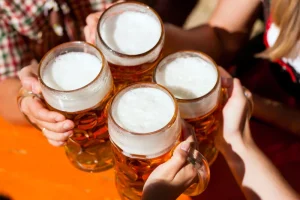
Although alcohol may help you fall asleep at first, it will wake you up later in the night. If you’re struggling to sleep, there are a few things you can do to try and break the cycle of drinking yourself to sleep. First, avoid drinking alcohol for at least four hours before bed. This will give your body time to metabolize the alcohol and hopefully allow you to fall asleep without it.
Which alcoholic drinks are the worst for sleep?
And the side effects like irritability and tiredness the next day can impact your life and those around you. Insomnia is defined as regular trouble falling asleep and/or waking up throughout the night. It is sometimes caused by disruption to your body clock, or circadian rhythm. Alcohol affects your circadian rhythm making it more likely to worsen your insomnia, rather than improving your sleep.
Break The Cycle Of Drinking Yourself To Sleep
Figuring out how to sleep without alcohol can be an exhausting process in its own right. The more you build on your belief you need alcohol to sleep, the more drink becomes a crucial part of your nighttime routine. If you find you’re struggling with sleep, and you can’t sleep without alcohol, you may want to consider some additional treatments for insomnia. Though we know alcohol isn’t a great way to get to sleep long-term, it can feel like a good choice when you’re struggling with insomnia. However, the more reliant you become on using alcohol to sleep, the harder it’s going to be to change your routine again. If you’ve been using alcohol to sleep for a while, you might think you can’t sleep without drinking.

Insurance Providers

If you live with other people, ask them to remind you how to sleep without alcohol or prompt you, when they notice you breaking your positive new habits. If you live alone, write down reminders to yourself, even keep a journal to keep track of your progress. ‘Cold turkey’ refers to when people give up an addiction like alcohol in one go without a controlled withdrawal process. In some instances this can work — you go through the tough period then it’s done with.
- If you’re having trouble sleeping, it’s essential to find a way to relax.
- Alcohol can make you sleepy initially, by influencing your brain function.
- Alcohol addiction treatment will begin with a detox period that focuses on managing any uncomfortable or severe withdrawal symptoms that arise.
- If sleep issues persist despite maintaining sobriety and practicing good sleep hygiene, it may be beneficial to seek professional help.
- Seeking professional help from a sleep specialist or therapist can also provide personalized guidance and support in overcoming the reliance on alcohol for sleep.
- You may wake up feeling tired and unrested, which can lead to drinking more alcohol in an attempt to fall asleep again.
This involves adopting habits and creating an environment that promote restful sleep. Two key aspects of sleep hygiene =https://ecosoberhouse.com/ are establishing a bedtime routine and creating a sleep-friendly environment. We publish material that is researched, cited, edited and reviewed by licensed medical professionals. The information we provide is not intended to be a substitute for professional medical advice, diagnosis or treatment. It should not be used in place of the advice of your physician or other qualified healthcare provider.
Improved mental health and emotional stability
An older study concluded that alcohol might reduce sleep in the first half of sleep and increase disruption in the second half. The substance causes sleepiness by increasing the marijuana addiction functioning of the gamma-aminobutyric acid (GABA) neurotransmitter. The GABA’s main function is to slow down body and brain activity.

Embracing an alcohol-free lifestyle for optimal health
This is in agreement with our findings that, among men, drinking decreased overall sleep duration and increased sleep disturbances. The problem with drinking alcohol before sleeping is that it negatively impacts your sleep quality. Alcohol interrupts your natural sleep cycle, reducing the restorative benefits you get from deep sleep. You wake up more often in the night, you rarely reach deep sleep, and you don’t sleep for as long as you should. A sleep specialist may recommend lifestyle changes, such as improving sleep hygiene, implementing relaxation techniques, or adjusting your sleep environment. They may also explore any underlying sleep disorders that could be contributing to your difficulty falling asleep without alcohol.
